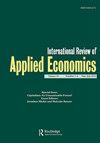The link between households’ durable asset accumulation and healthcare utilisation and spending
IF 1.6
Q3 ECONOMICS
引用次数: 0
Abstract
In developing countries with less advanced financial systems, the accumulation of durable assets remains key to enhancing household welfare. Despite this, studies that explore the link between asset accumulation and health outcomes have largely focused on financial assets. We contribute to the literature by examining the effect of durable asset accumulation on healthcare utilisation and spending using data from a comprehensive and nationally representative survey data in Ghana. Our preferred endogeneity-corrected estimates indicate that a standard deviation increase in asset accumulation is associated with 1.741 and 0.598 standard deviations improvement in healthcare utilisation and spending, respectively. These findings are robust to alternative approaches to addressing endogeneity and different ways of conceptualising asset accumulation. Heterogeneities in findings for gender, location, and for decomposed health expenditures are also explored. We identify education and entrepreneurship as important channels through which asset accumulation influences healthcare utilisation and spending, respectively, and recognise the need for flexible policies that enhance households’ accumulation of durable assets, especially in developing countries.家庭持久资产积累与医疗保健利用和支出之间的联系
在金融体系不太发达的发展中国家,持久资产的积累仍然是提高家庭福利的关键。尽管如此,探索资产积累与健康结果之间联系的研究主要集中在金融资产上。我们通过使用来自加纳全面且具有全国代表性的调查数据的数据来检查持久资产积累对医疗保健利用和支出的影响,从而为文献做出贡献。我们首选的内生性校正估计表明,资产积累的标准差增加分别与医疗保健利用和支出的1.741和0.598标准差改善相关。这些发现是稳健的替代方法来解决内生性和不同的方式概念化资产积累。还探讨了性别、地点和分解卫生支出的调查结果的异质性。我们确定教育和创业是资产积累分别影响医疗保健利用和支出的重要渠道,并认识到需要制定灵活的政策,以增强家庭持久资产的积累,特别是在发展中国家。
本文章由计算机程序翻译,如有差异,请以英文原文为准。
求助全文
约1分钟内获得全文
求助全文
来源期刊

International Review of Applied Economics
ECONOMICS-
CiteScore
4.30
自引率
4.50%
发文量
37
期刊介绍:
International Review of Applied Economics is devoted to the practical applications of economic ideas. Applied economics is widely interpreted to embrace empirical work and the application of economics to the evaluation and development of economic policies. The interaction between empirical work and economic policy is an important feature of the journal. The Journal is peer reviewed and international in scope. Articles that draw lessons from the experience of one country for the benefit of others, or that seek to make cross-country comparisons are particularly welcomed. Contributions which discuss policy issues from theoretical positions neglected in other journals are also encouraged.
 求助内容:
求助内容: 应助结果提醒方式:
应助结果提醒方式:


